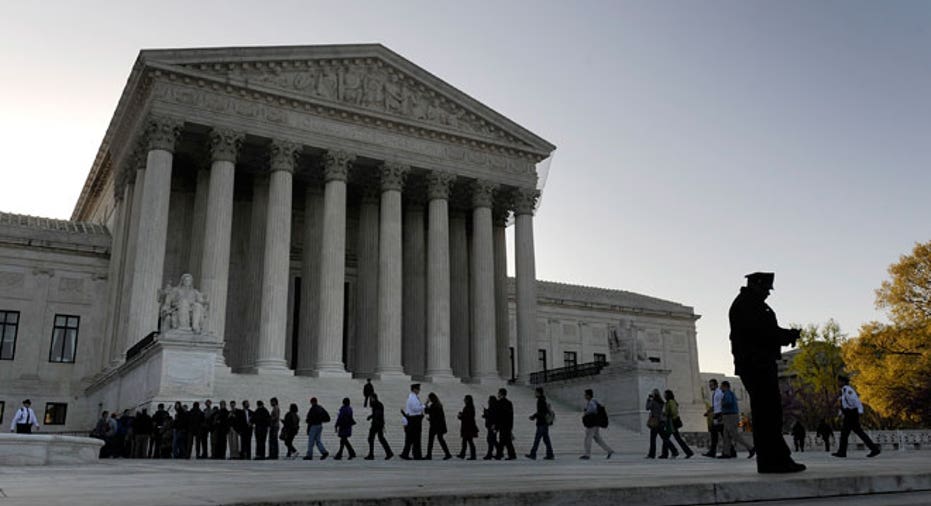Supreme Court Rules ObamaCare is Constitutional

After months of speculation, the Supreme Court upheld the president’s signature health-care reform Thursday. In a 5-4 decision, the country’s highest court ruled the Patient Protection and Affordable Care Act constitutional, and does not exceed Congress’ scope of powers.
In a 65-page ruling, the court ruled the individual mandate that requires most Americans to have health insurance or face a fine as constitutional, qualifying the provision as a tax.
J.D. Piro, senior vice president and leader of the health law group at Aon Hewitt explains that the government justified its power to mandate coverage in two arguments, through the Commerce Cause and its ability to tax. “The court ruled that it wasn’t a valid exercise of the Commerce Clause, but it is a valid exercise of taxing powers.”
Starting in 2014, citizens without insurance will be fined $285 per family or 1% of income--whichever is greater. The penalty jumps to $2,085 per family or 2.5% of income, in 2016.
“The Affordable Care Act's requirement that certain individuals pay a financial penalty for not obtaining health insurance may reasonably be characterized as a tax,'' Chief Justice John Roberts wrote for the court's majority in the opinion. "Because the Constitution permits such a tax, it is not our role to forbid it, or to pass upon its wisdom or fairness.”
House Democratic Leader Nancy Pelosi, who was a key player in the passage of the reform in 2010, wore her “lucky” purple pumps today, according to an aide, the same pair she wore the day the act was signed into law. “Call it what you will it is a step forward for the American people,” she said at a press conference in regard to the court labeling the mandate as a tax. “We'll take yes for an answer, you are using Washington talk.”
Surprising many observers, Chief Justice Roberts was the swing vote in the landmark case, upholding the law along with Stephen Breyer, Ruth Bader Ginsburg, Elena Kagan and Sonia Sotomayor. Dissenting were Justices Antonin Scalia, Anthony Kennedy, Clarence Thomas and Samuel Alito, who said they would have struck down the law in its entirety.
The one area where the court ruled lawmakers exceeded their powers was in the Medicaid provision of the law. While they said the expansion of the program was legal, they can not strip states of Medicaid funds if they fail to participate. The court said it threatens existing funds to states.
Twenty-six states plus the National Federation of Independent Businesses and four small business owners challenged the constitutionality of the president’s Affordable Care Act in Case 11-398, the Department of Health and Human Services v. Florida.
The case was arguably the biggest test to the legislative branch’s power since the New Deal —and the court’s upholding extends more certainty to businesses that have been hesitant to hire without knowing reform’s fate.
Despite the certainty of knowing what regulations they must comply with, Piro says the reform is still going to be difficult to implement. “Businesses are going to need regulatory guidance from the IRS, Labor Department and the Health and Human Services Department on a whole range of issues like who is a full-time employee, what qualifies as preventative health services? All of the complexity of the act is still there.”
The 2,700-page legislation, which was passed by Congress in March 2010 despite Republican opposition, has already emerged as a major campaign issue—with both President Obama and GOP Presidential candidate Mitt Romney making remarks shortly after the ruling.
Making a statement ahead of the president, Romney said he would act to repeal the sweeping legislation. “What the court did today was say that Obamacare does not violate the Constitution. What they did not do was say that Obamacare is good law, or that it’s good policy. Obamacare was bad policy yesterday, it’s bad policy today. Obamacare was bad law yesterday, it’s bad law today.”
The president called the decision a victory for the entire country, and that it’s time to move on. "What we won't do - what the country can't afford to do - is re-fight the political battles of two years ago or go back to the way things were. With today's announcement, it's time for us to move forward."
The justices heard six hours of oral arguments over three days starting March 26, as the government argued the Commerce Clause granted Congress the power to mandate health insurance.



















